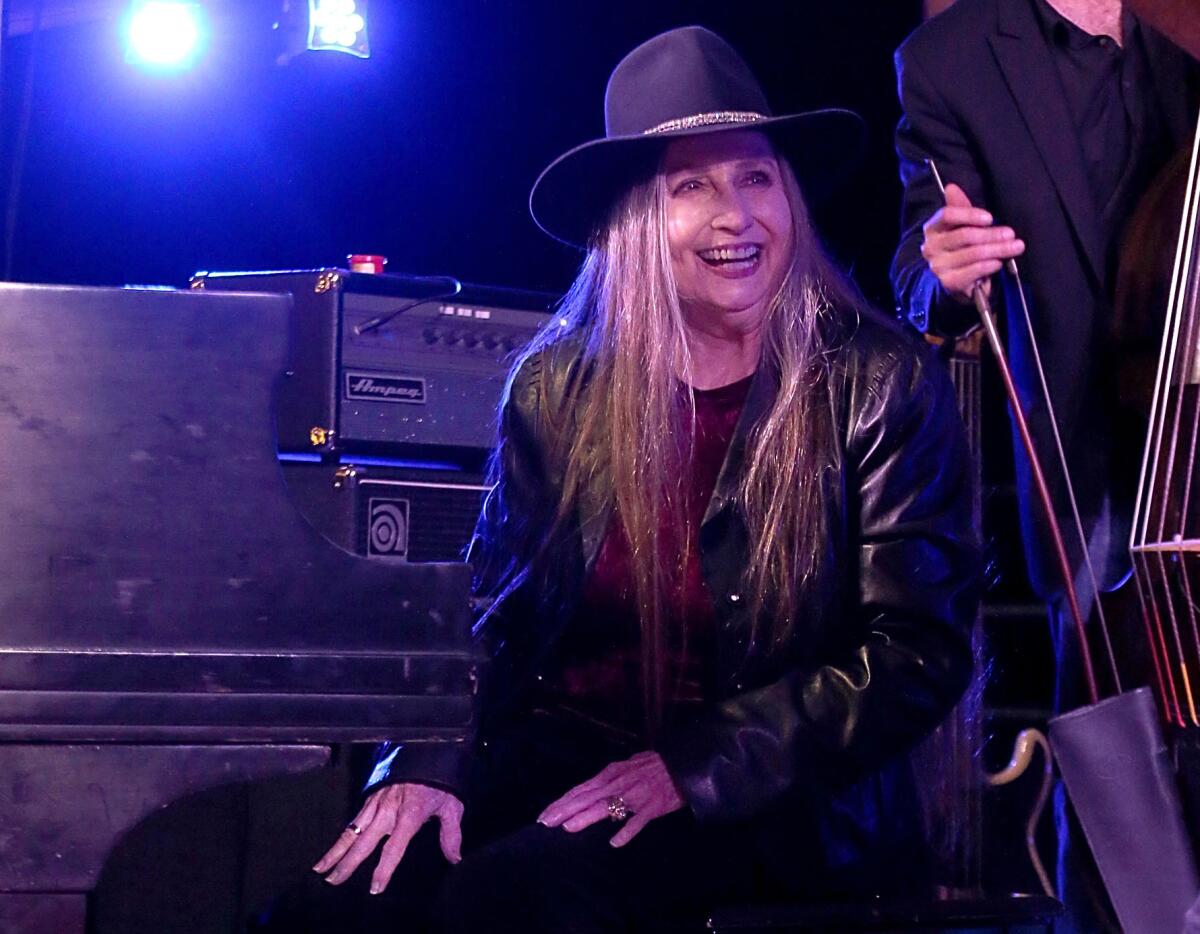Bobbie Nelson, sister and longtime bandmate of Willie Nelson, dies at 91

- Share via
Bobbie Nelson, who played piano alongside her younger brother, Willie Nelson, for the better part of their lives, died on Thursday. She was 91.
Her death was announced by Willie’s publicist: “Her elegance, grace, beauty and talent made this world a better place. She was the first member of Willie’s band, as his pianist and singer. Our hearts are broken and she will be deeply missed. But we are so lucky to have had her in our lives.”
No cause of death was given.
As an anchor in Willie’s aptly named backing band the Family — his son Lukas would become part of the group in 2013 — Bobbie provided supple, sympathetic support, able to play greasy honky-tonk with the same ease as she did Western swing. The siblings played music together as children; their professional connection formed when Willie began to develop his outlaw country in the early 1970s, just after he spent several frustrating years in Nashville. Bobbie played on “Shotgun Willie,” the 1973 album on which he developed his blueprint for outlaw country, then stayed with her brother for the rest of her life, finding a comfortable home within the Family. She rarely stepped outside of the group; in 2007, at age 76, she released her debut album, “Audiobiography.”

Willie harbored a deep love for Bobbie, whom he affectionately and jokingly called his “little sister” onstage. (Willie will turn 89 on April 29.) Unlike her brother, Bobbie did not partake of marijuana; she was Christian and a teetotaler. Despite their differences in temperament, the pair were close throughout their entire lives — she once claimed they never had a fight — and the siblings documented their relationship in a joint memoir, “Me and Sister Bobbie: True Tales of the Family Band,” published in 2020.
While promoting the book, Willie remarked, “Sister Bobbie is 10 times a better musician than I am.”
He wasn’t her only admirer. Americana artist Amanda Shires wrote on social media, “she was the first example I had of a woman playing music while also having a family.” Country singer Margo Price tweeted, “Nobody played piano like Bobbie Nelson and nobody ever will. She was the epitome of class, grace, and style... .”
Born on Jan. 1, 1931, in Abbott, Texas, Bobbie was the first child of Myrle Marie and Ira Doyle Nelson, who were teenagers when they became parents. The couple separated shortly after the birth of her brother, Willie, with the two children being raised by their paternal grandparents.
Bobbie’s grandmother taught her how to play the pipe organ and she began singing gospel music in church. Her grandfather bought her a piano when she was 6. She recalled, “The first time I ever played the piano, I thought, ‘I’ll never be lonely again.’” Within a few years, she and Willie would regularly play music together around the house and in church and school.
At 16, she met an Army veteran named Bud Fletcher. The pair married within a year. Fletcher didn’t play music, but he saw something special in the instrumental chemistry between his wife and her brother, so he formed Bud Fletcher & the Texans, enlisting the Nelson patriarch, Ira, as rhythm guitarist. As the band got off the ground, Bobbie and Bud started a family. When she was 19, she gave birth to Randy; by 23, she had two more sons, Michael and Freddy. The couple’s relationship started to fracture in 1955 when Fletcher’s parents sued for custody of their children, claiming Bobbie was unfit because she spent her nights playing piano in beer joints.
Distraught, Bobbie left the band and took up office work, getting a job with the Hammond Organ Co. in Fort Worth. She regained rights to her children but wasn’t able to salvage her marriage. After the divorce, Bobbie moved to Austin, where she demonstrated Hammond organs during the day and played lounge piano at night.

By the dawn of the 1970s, Bobbie had cycled through two additional marriages and her sons had reached adulthood, so when her brother Willie summoned her to play on his initial sessions for Atlantic in 1973, she was eager to accept. Willie signed with Atlantic after a creatively frustrating run at RCA. His new label encouraged experimentation, so he augmented his road band with members of Doug Sahm’s Sir Douglas Quintet, adding Bobbie as the final element to the mix. During these New York City sessions, they wound up with the core of “Shotgun Willie,” the album that helped define the outlaw spirit of the 1970s, and “The Troublemaker,” a gospel record that demonstrated the breadth of Willie’s vision.
Willie didn’t have a mainstream hit until Columbia released “Red Headed Stranger” in 1975, but those early Atlantic records established the aesthetic he’d mine for the rest of his career. Bobbie kept him grounded as the Family wove together country boogie, blues shuffles, cowboy ballads, pop standards and open-ended jams, playing with the dexterity needed for a band whose performances could be as improv-heavy as the Grateful Dead’s.
After “Red Headed Stranger,” the membership of the Family remained firm, with Bobbie forming the band’s core alongside drummer Paul English and harmonica player Mickey Raphael. Bobbie’s fortunes were often tied to Willie’s — in 1976, he purchased her a lavish Bösendorfer grand piano, which the Internal Revenue Service confiscated during his protracted battles with the organization; friends of the family bought it back for her — but her modest presence and graceful technique helped keep the Family lively into the 21st century.
Bobbie’s final gig was alongside Willie at the Whitewater Amphitheater in New Braunfels, Texas, on Oct. 9, 2021.
She is survived by Willie and her son Freddy Fletcher.
More to Read
The biggest entertainment stories
Get our big stories about Hollywood, film, television, music, arts, culture and more right in your inbox as soon as they publish.
You may occasionally receive promotional content from the Los Angeles Times.








